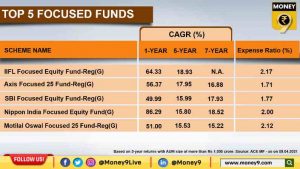These focused funds rallied over 50% in the last one year
Focused funds create a portfolio by restricting investments to high conviction stocks with optimal diversification
- Harsh Chauhan
- Last Updated : April 13, 2021, 19:12 IST

As a kid, we all have read about Arjuna and the fish’s eye story, in which he shoots the arrow and it hits the target. The moral of the story is to have a razor-sharp focus on what you want to achieve and close out all other distractions and concentrate only on your target.
We all know being focused on one thing for a certain period allows us to do a better quality of work, more work gets done quicker, being less stressed and happier. The same stands true even for investing. Investing with a focus helps you eliminate the disturbance, concentrate on quality assets that help to create wealth in the long term. If you are someone who is looking for a product that focuses on a particular investment rationale, then focused funds are for you. Let’s first understand what focused funds are.
Focused funds
Focused funds, as the name suggest, concentrate on creating a portfolio by restricting investments to high conviction stocks with optimal diversification. As per SEBI’s mandate, a focused fund can invest in a maximum of 30 stocks with a minimum exposure of 65% of the portfolio in equity and equity-related instruments. Focused funds can invest across market capitalization – i.e., large-cap, mid-cap and small-cap.
Understanding the risks
While the fundamental philosophy of investment is not to put all eggs in one basket – aim for diversification. Focused funds defies this philosophy as the rationale here is too many stocks in the portfolio may dilute the benefits of performing stocks. This results in them not being diversified and that can the source of risk. The risk these funds carry is higher than diversified mutual funds like multi-cap funds.
Investment horizon
A polarised market (when only a few stocks/sectors are rallying) focused funds tend to beat the broader market. However, in the broad-based market rally, they might underperform. Hence an investor needs to keep this in mind and have the patience to invest for a longer tenure of five years or more.
Best performing focused funds
Now that you have understood what focused funds, investment horizon and risk associated with them. Here is a look at the top five focused funds:

Tax implications
When you redeem the units of a Focused fund, you earn taxable capital gains. The rate at which you will be taxed depends on the period for which you stayed invested in the scheme – the holding period. The tax rates are as follows:
Short Term Capital Gain (STCG) – A holding period of up to one year. STCG is taxed at 15%.
Long Term Capital Gain (LTCG) – A holding period of more than one year. There is no tax on LTCG of up to Rs. 1 lakh. Above this amount, LTCG is taxed at the rate of 10% without the benefit of indexation.
(Disclaimer: The above list is for informational purpose only. Before investing, please consult your financial adviser.)
Download Money9 App for the latest updates on Personal Finance.
Related
- मल्टीकैप फंडों ने मचाया धमाल, 1 साल में दिया 56 फीसदी तक का रिटर्न
- उतार-चढ़ाव वाले बाजार में भी फायदा, इस वैल्यू फंड में निफ्टी से ज्यादा फायदा
- बाजार की रफ्तार का उठाएं फायदा, मोमेंटम इंडेक्स फंड में निवेश का है माकूल वक्त
- एक साल में दिया 31 फीसदी तक का रिटर्न, इस बैलेंस्ड एडवांटेज फंड का रहा जलवा
- इस फंड ने 20 साल में 10 लाख का बना दिया 4.50 करोड़, निफ्टी से दोगुना दिया रिटर्न
- Budget’24: LTCG gains tax hiked, but here’s you can save more on your investments now

